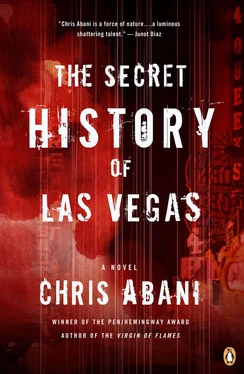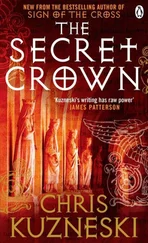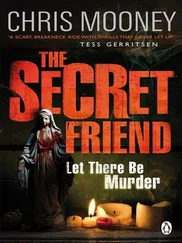Vegas is really an African city, Sunil thought. What other imagination would build such a grandiose tomb to itself? And just like in every major city across Africa, from Cairo to his hometown of Johannesburg, the palatial exteriors of the city architecture barely screened the seething poverty, the homelessness, and the despair that spread in townships and shantytowns as far as the eye could see. But just as there, here in Vegas the glamour beguiled and blinded all but those truly intent on seeing, and in this way the tinsel of it mocked the obsessive hope of those who flocked there.
In Johannesburg there had been the allure of gold and untold monies to be made in the mines. Gold so plentiful, there were hills of it. No one bothered to explain to the obsessed that the glittering hills were just a trick of the light — mounds of yellow sand dug up for the gold, the silicate glowing in the sun with false promise. No wonder he felt at home here.
He hadn’t lived in Johannesburg since White Alice left, shortly after his mother was taken to the madhouse, and he had returned only once in the years since, just after apartheid officially came to an end. He’d been shocked then to see that the once vibrant city center had turned into a ghost town. Indians and whites had emptied out, fleeing either abroad or to the suburbs. What surprised Sunil, though, was that in the wake of that flight, the city hadn’t been filled by South African blacks leaving the townships for more salubrious digs, but by Nigerian and Senegalese businessmen selling everything from the popular Nollywood movies to phone cards. The feeling of racial camaraderie hadn’t been extended to these invading blacks, who the more gentle South Africans thought were worse than Zulus, which was saying something.
Now Sunil thought of Las Vegas as home. That’s the thing about having always been a displaced person; home was not a physical space but rather an internal landscape, a feeling that he could anchor to different places. Some took easier than others, and although it was always hard work, he was good at it.
He had come to Vegas from Cape Town seven years ago to codirect a new research project at the Desert Palms Institute, which, among its many government contracts and research projects with no oversight, was studying psychopathic behavior. This was the project Sunil had come here to work on. He had expected to enjoy the work, but what he had not expected was that he would fall in love with the city.
His attention returned to the coming night and the darkness that held nothing but what was projected. Was night the same everywhere? In the Soweto of his childhood the darkness was a contradiction of lights, noise, and an absolute stillness that held only police cars cockroaching through. Here in Las Vegas, near the Strip, where it never really got dark, could anything be revealed in the bright neon? He often tried to read the faces teeming there but quickly realized that everything was obscured, even in revelation; the brightness was its own kind of night.
Noticing that the coffee had run in a tiny rivulet down the side of the cup, Sunil frowned and reached for his monogrammed handkerchief, a throwback to his childhood, to the older men in Soweto who always seemed to have a clean handkerchief on them, no matter how threadbare and patched. He wiped the rivulet away, brows furrowed in concentration.
There was an exactness to Sunil that spilled out into the world and was reflected in his sense of order: the neat row of very sharp pencils in the carved ebony holder on his desk, upright and ranked by use like soldiers on a parade ground; the sharp diagonal line connecting the brushed aluminum box of multicolored paper clips and the stapler; the small photo, not much bigger than a baseball card, held in a solid block of Perspex, angled so that it was visible to him and anyone sitting across from him.
The photo was of a man with a red turban and a thick black beard and mustache. It was eroded on one side, the man’s face disappearing under a mottled furry stain. Sunil still sometimes wondered if it really was his father or a generic photo of a guru that his mother had bought in the market. He’d been too scared to ask and he regretted that.
Against one wall, color photographs of zebu cattle were arranged like the speckled squares of a Rubik’s Cube. The riotous color and patterns of the cattle hides contradicted all his control. Like a tarot deck, Asia had said the first and only time she’d come to his office. They’d had sex on the sofa and, walking around nude, she’d stopped by the wall, mentally shuffling the framed cows, trying to read the spread. He’d felt more naked than she was in that moment, more revealed than when they had sex, and though she came to his home often after that, he never asked her back to the office again.
He sighed now and crossed to the sideboard to pour himself some more coffee, wondering if he should call her and see if she was free tonight. It was Halloween, though, and she was no doubt busier tonight than on other nights. Everyone else was.
Eskia was sitting in his car in the parking lot of the Desert Palms Institute, watching Sunil’s sixth-floor office. He had followed Sunil from a distance for days, always staying just out of sight, always within touching distance. He couldn’t believe how soft America had made Sunil. In the past he would never have been able to get this close to him. Those were the days — days that Eskia both loved and hated. Days that he could never forget, never quite muster the will to leave behind. He said the word, apartheid, under his breath. The way someone says the name of a lover they want to murder and fuck at the same time. His character had been forged in that crucible, in that dysfunctional relationship. Yep, Sunil had become as soft as the police. They were the easiest to follow, they never saw it coming, their sense of complete invincibility made them blind. Eskia laughed at the thought of Sunil being like the police.
There was a small bag of biltong on the seat beside him and he chewed thoughtfully on the cured meat, grateful that he’d been able to get it past customs. The last time he’d had to make do with American jerky. He took a swig from the Dr Pepper that was not as cold as he liked it, and a bite of biltong, and looked up at the window he had seen Sunil standing in. It didn’t seem to bother Eskia that he was in plain sight in the parking lot and that the thick-rimmed plastic-framed glasses were the only disguise he wore. It was surprising how people never gave nerds a second glance, how this look always blurred into a generic account if witnesses were pressed to recall who they’d seen.
He’d learned from his years working undercover for the African National Congress, the political party Nelson Mandela led, that this disguise was most effective on white people. Something about a black man in thick Clark Kent glasses threw off their balance and they simply edited him out of their perceptual reality. He even checked into hotels under the name Clark Kent, and no one ever made a joke when he presented his papers, pushing his oversize glasses up his nose. Not at the hotels, not at the airport or in customs or immigration: nowhere. If it worked for Superman, he always said, it was good enough for him. Besides, the security guards at the institute were predictable and not paid well.
What he’d come for would be easier than he thought, but no less fun. He was here to kill Sunil.
He leaned back to wait. He was good at that.
Sunil touched the soft leather of his desk chair. With his forefinger and thumb he rubbed at a line of dust that had become visible in a shaft of light, making a mental note to speak to the cleaner. It would be the third time this week. Really, he sighed, and reached for his phone.
Читать дальше












